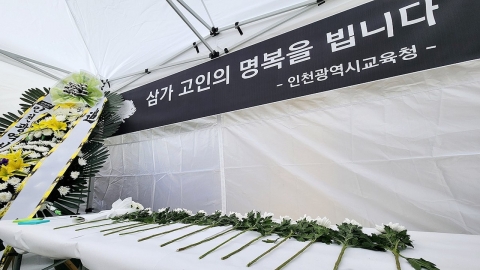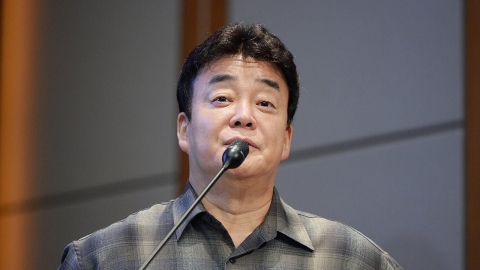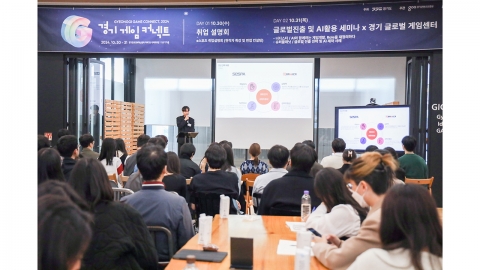-Semiconductor diplomacy at an important time, league starts between countries
-Each country's semiconductor support budget ↑ Korea's share by 2030 as it is ↓
-Yongin Cluster Success No firm measures for power supply and demand
-Renewable + Nuclear Power + Nuclear Waste Action, We Need to Give a Portfolio
■ Host: Reporter Cho Tae-hyun
■ Air date: November 6, 2024 (Wednesday)
■ Talk: Park Young-sun, former Minister of SMEs and Startups
-National Data Center targets 2030 late, needs to be faster
-Semiconductor Direct Subsidy Principles Needed
-Taiwan + US Direct Subsidy Case Analysis and Korean-style Subsidy Targeting 必
* The text below may differ from the actual broadcast content, so please check the broadcast for more accurate information.
◆ Reporter Cho Tae-hyun (hereinafter referred to as Cho Tae-hyun): It's a big event that attracts the attention of people all over the world. Voting for the U.S. presidential election is underway. There is an analysis that it is very close, but the result will only be known by opening the lid. However, few people seem to object to the prospect of the semiconductor industry becoming more difficult and fiercer, regardless of who is Trump or Harris. Let's take a look at this part of why it means this and what we should do about it. I will connect you by phone, former Minister of SMEs and Startups Park Young-sun. Sir, are you out?
◇ Park Young-sun, former Minister of SMEs and Startups (hereinafter referred to as Park Young-sun): Yes, how are you?
◆ Cho Tae-hyun: Yes, how are you? Before we start, let's ask a difficult question. What do you think of the U.S. presidential election?
◇ Park Young-sun: I think we really have to wait until the end. However, as far as I know, the exit poll will be announced from 9 o'clock in Korean time, but no news has been released yet.
◆ Cho Tae-hyun: When I saw the news just now, I think I had a good feeling. on the likeability side
◇ Park Young-sun: Of course, SARS is high.
◆ Right, as expected.
◇ Park Young-sun: When the vote counting starts, isn't the vote counting time different in the southern region, where Trump is highly supported, and in the U.S., the vote counting time varies from state to state? That's why the results of the vote count come out first in the southern part of the country, so the initial situation goes to Trump's advantage, and the point of view is whether Hwayx can overturn it or not. So I think we have to wait and see this election until the end.
◆ Cho Tae-hyun: Whether it will be a red mirage or how Trump can just keep pushing, I think we should look at these things as a point to watch, but we're interested in this because the U.S. has such a huge impact on the global economy. I think Korea is also preparing for many scenarios, but I'm going to focus a little more on the semiconductor industry today. I think there is a prospect that semiconductors will be a little more hit when Trump wins re-election. What do you think, sir?
◇ Park Young-sun: That's right. So if Harris becomes Harris, it's predictable in the current situation, but when Trump becomes Trump, this uncertainty grows, so there's a lot of concern. In particular, Trump's favorite policy is tariff policy. So it would be possible to express that you prefer tariff policies to allies. I will impose tariffs on companies to move their factories to the United States. This is Trump's strategy. However, from the perspective of Korea, Samsung Electronics is already building a factory in the United States with a huge investment of 44 billion won, and Hyundai Motor Company's Savannah plant in Georgia is almost complete. And now, Samsung Electronics has to receive $6.4 billion in subsidies from the Biden administration, but it has not received them. The same goes for Hyundai Motor.
◇ Park Young-sun: So, if Hayes improves, he can appeal to Harris to say, "Why don't you give subsidies when you say you're going to give them to them through the Democratic Party of Korea?" But if Trump does, there's a 99% chance that he won't receive this subsidy, so it's expected that Trump's election will make it very difficult for Korean companies.
◆ Cho Tae-hyun: Not only Korean companies but also companies in other countries are becoming very difficult.
◇ Park Young-sun: Same here. Yes, so strategically, Hevis prioritizes alliances, but Trump prioritizes bilateral negotiations, so one-on-one negotiations, right? So, in the case of the Democratic Party of Korea, policy research on the semiconductor alliance between the U.S. and Japan, and how we will lead it and how we should position it here are important, but in the case of Trump, the loss is much greater now when we make a deal between your country and our country rather than solidarity or alliance. In particular, Trump sees China as an enemy, so the U.S. has been Russia. And for the past 40 years or so, after the establishment of diplomatic relations between the United States and China in 1979, it was constructive engagement, or constructive interaction. But in this constructive relationship, Trump wants to get out of it. This means that countries that invest in China and countries that have large trade with China will be excluded first.
◇ Park Young-sun: In that sense, it is possible to analyze that Korean companies are more difficult when they become Trump compared to other countries.
◆ Cho Tae-hyun: Even so, I think there will be more worries because I don't really understand a reasonable person. But if Vice President Harris is elected president this time, will the nation be better off? The strength will be weak, but in a big way, it's not much different. There's a prospect like this. Why do you think this is the case?
◇ Park Young-sun: The U.S. has already been confident that the U.S. has the upper hand in manufacturing, or high-tech, but even the upper hand in this high-tech is being challenged by China, so the core of Biden's policy is the high-fence small yard policy. The small field here is AI, semiconductor, and bio-quantum, and these four advanced technologies cannot be given to China. And I'll put a high fence on these four high-tech fields. I'll put up a tariff barrier. I'm going to take a regulatory policy now. It's this. But Trump is not just going to do these four things, but I'm mainly going to deal with everything more with tariffs. These are different things. That's why, whether it's Harris or Trump, it's the same thing that Korea is struggling. However, regarding certain regulations in China, I don't think there is only a crisis for us or necessarily a crisis. I also have a chance.
◇ Park Young-sun: Depending on how we do it, for example, Trump is now vowing to impose a 60% tariff. If you put this tariff on it, won't Chinese goods be sold that much? So whether Korea takes that position as a substitute for this Chinese product is now the key.
◆ Cho Tae-hyun: Can it be a substitute?
◇ Park Young-sun: That's right. Is Korea only aiming for that kind of yard of Korea as an alternative? Japan, Taiwan, Singapore, Malaysia, Indonesia, Indonesia, and all countries are probably aiming for that now, right? That's right. That's why from now on, semiconductor diplomacy is very important, and I think I can tell you that it's a time when Korea's industrial policy and trade policy become very important.
◆ Cho Tae-hyun: You mentioned four areas of AI semiconductor quantum computer bio earlier, but it's not just an economic field, but a technology directly related to security, so I think countries are paying a lot of attention to fostering their own semiconductor industry. I think you're pouring a lot of money into it, how big is it? I think it's really amazing.
◇ Park Young-sun: It's incredible. So if you look at semiconductors, The U.S. is spending about $52.7 billion in Korean money on semiconductor intake. In the case of China, it was 1 trillion yuan, so in Korean money, it was 160 trillion won when it was announced, but I know it is about 190 trillion won because of the exchange rate. So China is pouring that much money. In the case of the EU, almost 62 trillion won, or almost the same amount of money as the United States, is now invested in semiconductors. Japan is investing about 7 billion dollars. In this situation, the semiconductor problem has already become a league between countries.
◆ Cho Tae-hyun: I lost my touch a little while ago, but the reason is how much are you investing?
◇ Park Young-sun: EU is about 62 trillion
◆ Cho Tae-hyun: This is incredible. Da
◇ Park Young-sun: Yes. However, by investing in this, it is said that it will expand the EU's semiconductor share to 20% by 2030. So, by 2030, when each country's plans are really going on normally, it seems that Korea's share will inevitably decrease. So, for example, the American Semiconductor Industry Association announced that Korea's share of semiconductors in the global market is currently about 30%, but Korea will decrease to 9% by 2030. So I thought, "I can't go with this scenario." So, I thought, "Korea needs to wake up and the government needs to wake up." Here's what I think.
◆ Cho Tae-hyun: Considering the proportion of semiconductors in Korea's GDP and related industries, it can be a very serious problem, but I don't think there are many measures that stand out in Korea. I think this evaluation comes out, do you agree with this evaluation?
◇ Park Young-sun: That's right. If you say the big thing now, I'll make Yongin cluster the top of the country early this year. I'll do that. And then the second is the announcement that we will create the National Thai Committee, which is the biggest axis in a way. In the case of this tolerance cluster, there is also a great deal of skepticism about whether it will ever succeed. The reason is because of electrical problems.
◆ Cho Tae-hyun: Power is a problem again.
◇ Park Young-sun: That's where the government is now expecting 10 gigawatts, but experts won't be able to do it with 10 gigawatts. You'll need 20 gigawatts. But if I explain this 10 gigawatts, 1 gigawatt is the amount that 750,000 households use. So 10 gigawatts requires a quarter of the power of the metropolitan area. Then, our government has no firm plan yet on where to draw this quarter of electricity from or what to make electricity. So, by mobilizing three LNGs with LNG, is it part of 3 gigawatts out of 10 gigawatts? Other than that, no details have been announced yet on the composition of this portfolio, whether to use renewable energy or nuclear power.
◆ Cho Tae-hyun: What do you think, Minister? Now, there is a movement around the world that nuclear power plants should be expanded again. What is the Minister's assessment?
◇ Park Young-sun: There's nothing but nuclear power plants. I have no choice but to go, but I'm 100% sure that I'm going to use nuclear power. This is impossible. That's why there's a problem with what to do with the ratio of renewable energy and nuclear power plants in the portfolio composition. In the case of renewable energy, the cost of electricity from transmission is a disadvantage, and in the case of a nuclear power plant, the residents' consent should be obtained at the location of the nuclear power plant, and follow-up measures on what to do with nuclear waste should be followed. However, the government has not yet come up with a specific plan to the people regarding follow-up measures or things like this. Based on the United States, it costs about $1.5 billion to produce 1 gigawatt, or about 2 trillion won in Korean money. So this is the U.S. standard. I haven't seen the data yet that how much it costs in Korea. Then it'll take 10 gigabytes. I left 10 gigabytes open, but I need 20 trillion won first.
◇ Park Young-sun: Based on the United States, then how do we cover this in relation to this 20 trillion won? I don't think there's a clear plan in place yet. And the National AI Committee also said it would create a national data center by 2030. The direction of creating this national data center is good and I need it. But I think 2030 is a little late. I'm thinking that we need to hurry a little more.
◆ Cho Tae-hyun: We need more speed and a more precise plan. Politicians are not letting go of it at all. We've also gathered opinions on the Special Act on Semiconductors. How does the Minister evaluate these contents? Will it be enough?
◇ Park Young-sun: Now, Kim Tae-nyeon from the Democratic Party of Korea and Ko Dong-jin from the People's Power have submitted their submissions. Rep. Kim Tae-nyeon's semiconductor law focuses on strengthening the ecosystem of the industrial semiconductor industry, including the establishment of the National Semiconductor Committee within the National Assembly and the provision of infrastructure such as power water and new and renewable energy facilities. Rep. Yong-jin's bill now creates a special committee to strengthen semiconductors, takes power and water support as the state's responsibility, and makes the creation of semiconductor clusters the main content. So, this seems to be a bill to support the Yongin Cluster National Industrial Complex.
◇ Park Young-sun: So in a way, Rep. Kim Tae-nyeon is focused on supporting the industrial ecosystem and emphasizing immediate government support and the central government-led system, but I think we should compromise these two bills well and come up with strategies for semiconductors and these measures in three stages, which are really short-term and long-term.
◆ Cho Tae-hyun: As you both said, both values are irreversible, so we need a bill that can be compromised well and contain both values, but some need to inject subsidies directly to semiconductor companies. These arguments are also constantly being raised. How do you rate this part, Minister?
◇ Park Young-sun: I agree with the logic that Korea should do subsidies because other countries are doing it now. But there should be a principle. Then, I think that the government is successfully and convincingly trying to persuade the people. Taiwan has huge tax benefits, especially from R&D investment. So, in this case of Taiwan, especially Taiwan, the support plan has been strengthened since 2024, but which way has been strengthened? It has been strengthened to the north to research and develop and increase manpower. Then, what kind of geopolitical similarities between the Taiwanese government and the Korean government, and the situation in which each country is very similar.
◇ Park Young-sun: It's very similar, so it's necessary to analyze Taiwan's case closely. For example, in Taiwan, there's an additional 5% tax credit for purchasing RND, for example, high-tech manufacturing equipment. And there is a tax credit of up to 25% on RND costs. In order to receive these tax benefits, companies spend at least 6 billion Taiwanese dollars a year on RND, or about 19 billion won in Korean money. You have to go over this to be able to apply. And the proportion of RND spending must also be satisfied at least 6% of the total expenditure. So why do we have this regulation? It's to enable Taiwan's continuous semiconductor companies to continue their research and development, especially to target certain companies that occupy important positions in the global supply chain, such as TSMC. Like this, we need to have the exact direction that our country targets, whether it's direct subsidies or tax credits.
◇ Park Young-sun: In the case of the United States, for example, the subsidy is mainly focused on encouraging factories to be built in underdeveloped areas and bringing people together in underdeveloped areas to develop them and create jobs. So, each country has its own characteristics, and I hope that Korea will analyze them in more detail and specify more accurately where and how to target Korean subsidies. And I can tell you that's one of the success factors.
◆ Cho Tae-hyun: There are a lot of implications. The growth of Taiwan's semiconductor industry like this is a factor that cannot be ignored even by clear and reasonable government support, so I think we should consider this fully, as you said. So far, I have pointed out various concerns surrounding Korea's semiconductor industry with former Minister of SMEs and Startups Park Young-sun. Thank you for talking today.
◇ Park Young-sun: Yes, thank you.
[Copyright holder (c) YTN Unauthorized reproduction, redistribution and use of AI data prohibited]
Economy
More- First day of listing in Dubon Korea, rising...It was 180% "surge".
- U.S. Presidential Election Watch Won-Dollar Exchange Rate Surge...It's around 1,390 won.
- Choi Sang-mok, "Request for an increase of 600 billion won in reserve funds in preparation for the U.S. presidential election."
- suspension of the effect of the paid-in capital increase of Korea Zinc Public Offering

![[Breaking News] Exit polls for the U.S. presidential election...Montana wins Utah Trump](https://www.ytn.co.kr/img/news/default_img.jpg)





![[Yetterview] 'Hell 2' Kim Seong-cheol, "Replace Yoo Ah-in, I feel like I'm up for the test..."I jumped in".](https://image.ytn.co.kr/general/jpg/2024/1106/202411061129487875_h.jpg)


